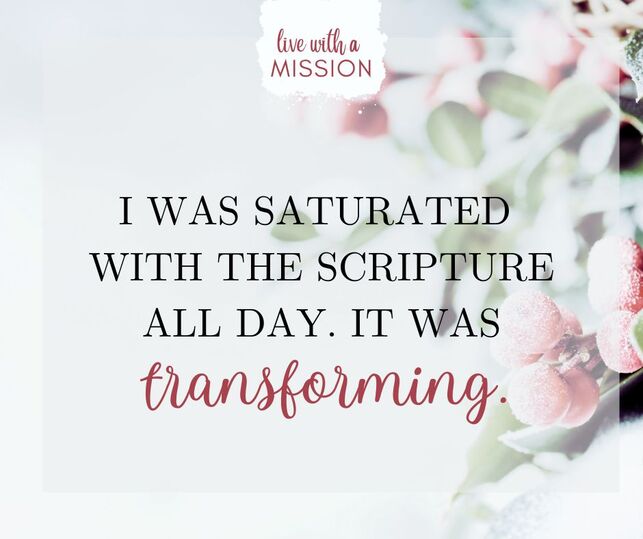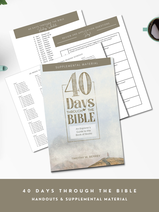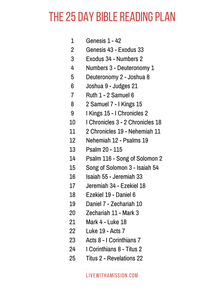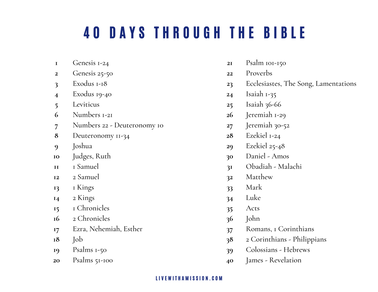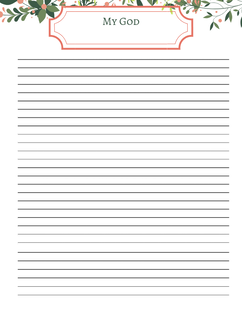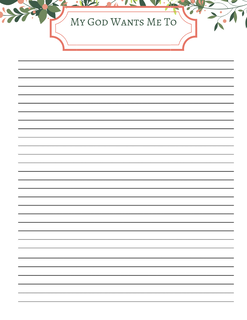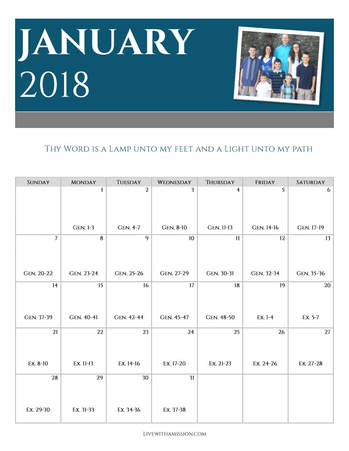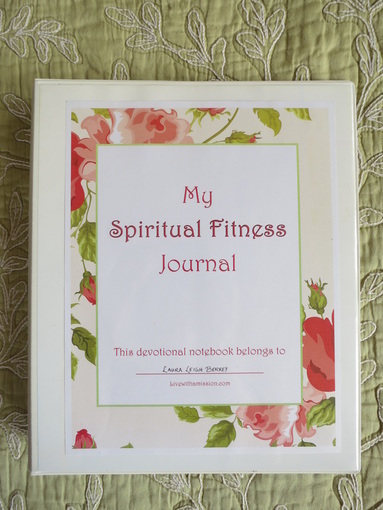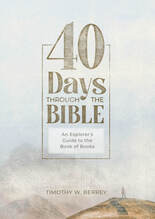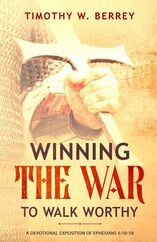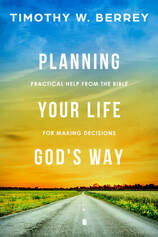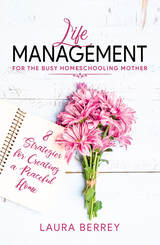|
I'm so thankful that Vera Jones shared this testimony with me. If you are wondering how you can soak up more of the Bible, this will be an encouragement and a help to you! When our pastor (my husband Frank Jones) challenged our church to consider reading the Bible in 40 days, I thought, “Sure, why not? This is a win-win!” I always read the Bible through each year. However, to read it in such large volumes at such a quick pace seemed daunting. Excuses flooded my mind, including my slow reading skills. But as I thought about it, I realized that even if it took me longer than 40 days, and I did not meet the challenge goal, I was still reading my Bible. Pastor sweetened the challenge when he promised each participant the book by Dr. Timothy Berrey, 40 Days Through the Bible. I signed up, as did eight others in our church. The first day of the new year was the start date and we began this journey. Pastor set up a text thread so we could encourage each other, post spiritual thoughts or nuggets we gleaned, share issues we were having, or get validation and help from the group. But the first week of January, I became ill. I did not have a high fever, but my sickness sent me to the couch. During this down time, when I was awake, I read. Within about 72 hours, I had returned to health. But now I was ahead of schedule. I thought being ahead was important because I did not know what might derail some of my reading in the upcoming weeks. Sundays would be difficult for me to read such large portions of Scripture because the day is so packed. Thus, being ahead would allow me to finish on schedule. Around 14 days into the reading, I found myself significantly ahead of the 40-day goal. My husband commented that it seemed like I was on pace for the 25-day challenge. When I checked the 25 Day Bible Reading Schedule in Dr. Berrey’s book, I realized I was even two days ahead of that one! I immediately switched plans and finished the reading in 20 days. How did the Lord enable me to accomplish this? 1. I identified activities I could postpone. Through the advice of two other people who have read the Bible in less than a year, I began looking at where I spend my time, and I quickly identified areas that could be set aside temporarily. Forty days is essentially 6 weeks. I knew I could catch up on those other things later. 2. I read and listened to the Bible. I had a reading Bible and an audio Bible set in different books. This made it easy to mark my place in each and kept me from getting confused. I listened via the audio Bible to the majority of the OT, most of the gospels, and a few other NT books. The other books I read in my reading Bible. Taking turns between reading and listening to someone else read provided a variety that I appreciated. Between reading and listening, I was saturated with the Scriptures all day. It was transforming. 3. I multitasked whenever I could. I listened while doing mundane duties of life like dressing, cooking, dishes, laundry, ironing, house chores, cleaning, exercising, and driving. The saturation of Scripture that was going on in my mind made these tasks more enjoyable. How did the Lord bless me through this? This was a challenge I will not forget. I thoroughly enjoyed it and learned much. I was illumined to a larger view of the Lord’s work. Patterns, repeated verses, and many of the Lord’s attributes and care were so much more evident. Reading in large volumes is like a fly-over survey of the Scriptures versus a hike through the woods. I have never read Joseph’s life and his bones returning to Canaan in the same reading section before. Reading books like Ezra, Nehemiah, and Esther in one sitting brought a more complete picture of that time in Israel’s history. Reading all of Isaiah in one day was amazing! This challenge was not a hard task and stimulated my growth in a unique way. I would encourage anyone to take this challenge. It does not have to begin with the new year. You can even complete it in 20, 35, 40, or 60 days because Blessed is he that readeth… Rev 1:3a. Contact us directly for a discounted price if you plan to purchase multiple copies of 40 Days Through the Bible for your ministry.
Over Christmas break, I read the entire Bible in 25 days. The closest I have come to doing this in the past was reading the New Testament over a similar length of time. Reading the entire Bible in 25 days may seem like an unattainable goal, but there are some who have read the Bible in one week. However, it marked a major milestone for me, and here are some things I learned from the experience. 1. It is very doable. First, it is eminently doable. In one of my Bibles, it amounts to an average of 58 pages per day. If you think about it, that’s not an impossible task. An adult with an average level of education can read 58-60 pages in two to three hours. Many can even read faster than that. If spending about two hours daily reading Scripture seems burdensome, think of how blithely many Christians will watch a two-hour video or spend two hours of internet surfing in order to relax after a day at work. The psalmist prayed that the Lord would turn his eyes from looking at things that are worthless (Psalm 119:37). Perhaps if God answered a prayer like that for us, it would give us more time to read His words. 2. The longest books can be read in one sitting. Second, even the longest books of the Bible are readable in one day, even in one sitting. For example, in sheer number of words, Jeremiah is the longest book of the Bible with about 33,000; Genesis is second, and Psalms, third. On previous occasions, I have read Isaiah, Jeremiah, and Ezekiel each in one sitting. It took me just under two hours to read Isaiah, just over two hours to read Ezekiel, and about two and a half hours to read Jeremiah. Admittedly, you will not capture or understand every detail of the book but that is not your goal in reading the entire book in one sitting. (More about that later.) But my point is this: if even reading Jeremiah or Ezekiel in one sitting is possible, how much more so the Gospel of Matthew, or any one of the four Gospels. In fact, after reading Jeremiah in one day, reading the Gospel of Matthew in a day seemed easy by comparison. And yet, how often have we been put off by the length of the Gospel of Matthew, convincing ourselves that due to its lengthiness we could never sit down and read it at one time or in one day in its entirety? 3. Reading a book in its entirety is incredibly valuable. Third, I was struck by the overwhelming value of reading an entire book of the Bible at one time. I can’t use enough adjectives for this experience: invaluable, fantastic, necessary, indispensable, important, life-changing, and all-encompassing. Many of our interpretational problems would be solved by reading an entire book of the Bible before weighing in on one of its verses. Persuasive, but deceived, religious figures have used verses in Isaiah to point to themselves—the “man from the east,” for example (Isa. 41:2)—when a full reading of Isaiah, or even just fully reading Isaiah 40-48, would make clear that the man in view is Cyrus the Great, the Persian world leader of the sixth century BC. 4. You make important Scriptural connections that would otherwise go unnoticed. In addition, reading an entire book allows you to see connections you might otherwise miss. I am thankful for a Bible with chapters and verses. Imagine trying to point people to your text in Jeremiah without these. But the truth is that sometimes these chapter divisions keep us from noticing the larger unfolding story or sequence of connected thoughts in a given book. This is partly due to the way we often base our Bible reading on chapter divisions. A daily Bible reader typically reads a certain number of chapters a day. He might, for example, read Genesis 37-40. Or he might be reading in multiple parts of the Bible every day and thus read Genesis 37, Psalm 5, Proverbs 6, and Matthew 7. There is nothing inherently wrong with such an approach. I spent much of 2019 reading 10 chapters a day, each chapter coming from a different book of the Bible, and it was a great blessing to be reading all over the Bible every day. But allow me to play devil’s advocate a little bit here. Think of a person who reads Genesis 37-40 for his daily Bible reading, shuts his Bible, and goes on his way. What he may not realize is that he was on the cusp of Joseph’s story arc transition from his downward spiral to his incredible exaltation. I think it is safe to say that the author (and Author) of Genesis did not mean for the reader to pause lengthily after reading 40:23. The suspense of the story itself ought to carry the reader into the next chapter. How much more so is this true if that same reader then continues the next day by reading Genesis 41-44! Four chapters of daily Bible reading is great—and more than many Christians accomplish—but the grand revelation of Joseph to his brothers takes place in Genesis 45:1. Everything in Genesis 44 (and the chapters preceding) has built up to this stunning moment when Joseph’s brothers find themselves unexpectedly and terrifyingly in the presence of the brother they sold into slavery. Furthermore, what you may also miss by not reading the story as a whole is the growing “Judah theme” in the Joseph story. God is working in and through Joseph in Genesis 37-50, but He is also working on Judah, making him into the leader from whom the Davidic Messiah will ultimately emerge. The Judah theme is most easily seen if you read the entire story. These examples come from Genesis, but Revelation, the last book of the Bible, affords similar examples of missed connections that can occur when we read isolated chapters. A good example is Revelation 5. A fascinating drama in and of itself as the Lamb takes the scroll with the seven seals, it is tightly connected with the vision of God’s heavenly throne room in Revelation 4. Revelation 6 is similarly connected. Too often, we refer to Revelation 6 as the “seal judgments,” as if they are a stand-alone phenomenon. Actually, the Lamb who received the scroll with the seven seals in chapter 5 (from the hand of the One seated on the throne in chapter 4) is the One opening the seven seals one at a time. Allow me one more example. Revelation 13 begins with the emergence of the Beast and ends with the mark of the beast on the hand or forehead of his followers. But if you keep reading into Revelation 14, you find that the followers of the Lamb have a mark (the Father’s name) on their foreheads too. The juxtaposition of these two chapters (or two sets of followers) is literarily intentional and so easily missed if we do not take in the entire book of Revelation as a whole. Both sets of followers are identifiable to their respective leaders. (By the way, Revelation may have 22 chapters but it is actually less than 10,000 words in length. That’s about the length of a 20-page book, which is very readable in one sitting.) Limits on our time demand that for most of us we read a certain number of chapters a day. We, most likely, cannot read the entire book of Genesis every time we come to it. But let’s be sensitive to the material in the book more than to the chapter divisions of the book, and attempt to pause in our reading at natural pauses in a book’s storyline. And, at least once in a while, shoot to read the book in its entirety. 5. Your day becomes filled with the reading of Scripture. Another thing I discovered is this: I found myself reading Scripture at odd moments of the day when I would no doubt have been doing something else. I am not saying that I would have been doing things of no value, but I would not have been reading Scripture. Why? Because I would have gotten my Scripture intake that morning, spent time in prayer, and then moved on into my day. But when you have a goal of reading the entire Bible in a short amount of time, you do not always finish in the morning. So at odd moments of the day, while standing in line or waiting for others to get ready for a family errand, you find yourself reading Scripture. I take away from this that I would read more Scripture if I had a goal of reading more Scripture. One of the best ways to be productive or to do productive things is to have the pressure of a goal. No one likes pressure but the truth is that reasonable pressure is good for us. Pressure is what motivates us to do things we know we should do but are too lazy or unmotivated to do unless under the constraints of a goal (or a boss or a deadline). Those who shoot at nothing are sure to hit it! 6. Learning to concentrate and read quickly becomes a necessity. Reading large amounts of Scripture is also a good way to learn to read more quickly or to remind yourself that there is a place for reading more quickly. When you sit down on a given morning with only two hours to read the entire book of Ezekiel, you push yourself to read more quickly, perhaps even more quickly than you thought possible. You make yourself concentrate, which is frankly a skill increasingly rare in our distracting modern world. Obviously, not all reading of Scripture should be fast. The Puritans distinguished between plow-work and deeper spade-work. We need both types of Bible study. I have to admit I prefer reading less Scripture in order to be able to do more spade-work. One year when I started my Bible reading at Genesis, I planned to read several chapters, and only made my way through the first three verses of Genesis 1. Forty-five minutes later, I came up satiated with all the truths I had seen in just those three verses. On the other hand, I am convinced that laziness or complacency in my Bible reading has led me to feel satisfied with reading a few chapters a day, knowing that I am on pace to read through the whole Bible within the calendar year, when the truth is I could have very easily upped the amount of what I was reading. What I am trying to say is this: under the guise of pursuing “deeper Bible study,” I have excused away hours of time in which I could have been reading far larger quantities of Scripture. In the future, I want to make sure that I do both (plow-work and spade-work). In truth, plow-work leads to spade-work. As I read quickly—taking in, for example, in a single day the entire Lucan corpus (his Gospel plus the book of Acts)—I came across things that I wanted to come back to for future study. On occasions like that, I would sometimes put a question mark or a brief comment in the margin to jog my memory in the future. 7. Planning to read more Bible during down times is best. One last observation is this: reading the Bible in a short amount of time works best during a down-time in your daily schedule. It is doable, as I observed above, by reading two to three hours per day. But some days are better “reading” days than others. All of us over a 25- or 30-day period will have days when our minds are more distracted than on other days (which will slow down our reading) or days in which our time to read is shorter or punctuated by interruptions. Planning to read a large portion of the Bible works best during vacation, or some other down-time in your daily routine, when you know you will have more time to read because your schedule is more under your control. There is an additional benefit: vacation often becomes a time when we spend less time with the Lord than normal. Too often, unintentionally, we end up vacationing away from the Lord. We can even feel that “vacation” provides an excuse to indulge our more carnal side a little. So we binge on social media, gaming, or movie-watching. Consequently, we come up dripping at the end of our vacation from the pool of the world’s delights, having temporarily satisfied some of our baser lusts but feeling (and knowing!) we are more distant from the Lord and more deadened to His voice than we ought (or meant) to be. Having a goal of reading large portions of Scripture during vacation mitigates that tendency. It does not mean you can have no fun on vacation. My wife (who joined me in the 25-day Bible reading challenge) and I both found ourselves spiritually refreshed after vacation. We had enjoyed a change of pace from our regular work week. We had vacationed in a beautiful place in the mountains. We had enjoyed time with family. We had played games and even watched some videos. But we had not vacationed away from our Lord. We had instead enjoyed many precious moments feasting on His Word. What a welcome change it was from walking in the counsel of the ungodly, standing in the way of sinners, and sitting at the seat of the scornful—the typical fare served on social media and most of twenty-first century entertainment! Want to do your own Bible Reading Challenge? Below are links for both a 25 Day Bible Reading Plan and a 40 Day Bible Reading Plan. Also, read this excellent article on binge-reading the Bible by Joel Arnold.
What Do I Know About My God?The first section in this notebook is about GOD. Fill in the title at the top with a characteristic or action of God. Some ideas are
What Do I Know About What God Wants From Me?The second section is all about what God wants from you. At the top of this page, fill in the title with something that you read in your devotional time in the Word that God wants you to be. On these lined pages, record verses that you have read in your devotional time that refer to that. Some examples are:
Start with just a few pages in each category. As God teaches you about Himself, add pages for new categories of things you are learning about your God or about what He wants from you. As you collect verses on these topics, you will have a resource for times when you need to study that topic or when a friend or one of your children is struggling and needs some encouragement. The goal of your devotional time is to learn about God. To come to know Him. Hebrews 11:6 tells us that God is a rewarder of them that diligently seek Him. Jeremiah 9:23-24 tells us that instead of glorying in our wisdom, might, or riches, we should glory in this: that we understand and know God. That is what God takes delight in! Thus saith the LORD, Let not the wise man glory in his wisdom, neither let the mighty man glory in his might, let not the rich man glory in his riches: But let him that glorieth glory in this, that he understandeth and knoweth me, that I am the LORD which exercise lovingkindness, judgment, and righteousness, in the earth: for in these things I delight, saith the LORD. How well do you know your God? How diligently are you seeking Him? Download this free devotional journal to help you learn more about God every day. But without faith it is impossible to please him: for he that cometh to God must believe that he is, and that he is a rewarder of them that diligently seek him. --Hebrews 11:6 By Laura Berrey I lost my cell phone once. (Actually, I lose it regularly, but this was the one time I really lost it.) I looked all over for it. It was during my pre-smart phone days, when phones were both dumb and cheap, so it wasn’t a huge hit financially if I didn’t recover it. And it was basically for emergencies only… my getting a text was as likely as stumbling across a swimming hole in the Sahara. But, still. It was my cell phone. So I dutifully searched for it for a week or two. At first, we tried calling it from my husband’s phone. But the battery must have died, because we never heard it ring from anywhere in the house. I could live without a cell phone for a while. I had six little children with arms like octopi, so I figured a chubby little toddler had seen it, found it temporarily distracting, and then dropped it somewhere that hopefully didn’t involve water and a seat. It would show up eventually, right? Or if not, no great loss. I lost a child once too. (Actually, we lost this particular child several times, but the first was the worst.) I had a radically different response to losing my child than I did to losing my cell phone. As soon as I realized he was missing, I went into full-on Mama Bear Mode. And I did not relax that until long after he was found and safely returned to the bosom of his family (i.e., me). That return occurred with much weeping and hysterically relieved praise to God. I was ready to kill not just the fatted calf, but sundry and all who would dare remove him from me, yea, even from my sight, for the next twenty-four hours or years. “Clingy” doesn’t cover it. What made the difference in my search methods? The value of the reward. I would have gladly paid any price for the return of my son, even my own life. But I could afford nonchalance over my cell phone. (Which I found, by the way, one day while changing the sheets on my bed. It had slipped down between the mattress and the bed frame, and there it lay, dead as a doornail. Diligence has its own reward.) When it comes to seeking God, only those who truly value the reward of finding Him will succeed. In order to seek Him, Hebrews 11:6 says, we must believe that He is (that He, first of all, exists; and secondly, that He is Who He says He is) and that He rewards those who diligently seek Him. He lets Himself be found. He, Himself, is the Reward. I didn’t need a bounty offered to me to prod me to seek my son. Finding him was all the reward I wanted. I was diligent in my search for him because I was desperate. Be diligent in your search for God. Feel your desperation for Him and let it motivate you. You will gain a rich Reward. God, Himself. Here are six resources for helping your children with their devotional life and Bible reading. Tools for Helping Your Children Read the Bible1. Use a family Bible-reading calendar. Make your own or personalize this calendar with your family photo and encourage your children to follow along. We try to make Sunday afternoons a catch-up day for those who may be lagging behind schedule. 2. Give your children a checklist. Children love to check things off! You can give them a dated checklist with a favorite Bible reading schedule or a simple checklist of chapters in the Bible. It is a delight to watch their progress through the Word of God! 3. Purchase a One-Year Bible. Some children prefer this method of reading. It gives them a balanced menu of OT, NT, Psalms, and Proverbs. The reading selections are dated, so it is easy to keep track of what day they are on. 4. Provide a Study Bible. For older children, a study Bible with extra information about the text may be just what they need to answer the questions they have as they read. 5. Use an audio Bible. For younger children who either don't read yet or who struggle with reading the more challenging words in the Bible, try an audio edition. Older children can listen to the Bible while following along in the text. Younger children could listen while playing (but you need to provide toys without noise). 6. Schedule a time in their day for their devotions. The older your children get, the better they will become at managing their time. But for most children, it will help them if they have a slot of time specifically dedicated to their personal devotional time. Do your children have a morning routine or bedtime routine that sets aside time for the very important activity of reading their Bible and praying? For some children, time might be the most helpful resource of all. MORE ABOUT THIS TOPIC:
Are you a man of courage, determined to obey God's commands? You need a battle plan. Remember Joshua? He was the man who, above any other individual in Scripture, is admonished to “act like a man.” Joshua 1:1-9 is a direct charge to him to “be strong and of good courage.” God orders him to act this way in light of his gargantuan task of bringing Israel across the Jordan River and into the Promised Land. His beloved mentor Moses is dead. The weight of responsibility now lies on his shoulders. He is to take courage in God’s command—"Have not I commanded you?"—and face his task. How does Joshua respond? He immediately swings into action (Joshua 1:10). He begins by commanding the leaders, “Prepare because within three days you will cross over the Jordan River.” What we must not miss is that Joshua is passing along the very command he received. God told Joshua to take courage and “go over” Jordan. Joshua has so taken courage that he now turns God’s command into a future tense verb for the people he leads: "You will cross over Jordan." Joshua then turns to the Transjordan tribes, the two-and-a-half tribes that would receive their inheritance east of the Jordan River, and reminds them that all the mighty men of valor are to cross over Jordan and assist the other tribes in wrestling their inheritance from the Canaanites (v. 14). If we continue to follow Joshua's actions, we see that right around the same time as his actions in chapter 1, he sends two spies to scope out the situation at Jericho (2:1). Why? Crossing the Jordan River will put the city of Jericho in their cross-hairs. Joshua is strategizing and thinking ahead. Joshua also moves from the Shittim camp—where they had been for the last several months—by transitioning to the Jordan itself (3:1). He then readies the people (3:5) and instructs the priests (3:6). Joshua moves fast: he takes all of these steps within a few days’ timeframe (regardless of how you interpret the various “three days” of the passage, 1:11; 2:22; 3:2). Joshua’s actions exemplify what a man does when he faces his responsibilities with courage. The command had gone out. He had been summoned to courage. His spirit within him rose up to obey. He then proceeded to work through the steps necessary to obey the command—ready the leaders, remind the Transjordan tribes, plan ahead for the battle at Jericho, move the camp to the Jordan, prepare the people, and instruct the priests. The point? Once a man has determined to show courage and obey, he thinks through the logical steps necessary to accomplish his God-given task and formulates a battle plan. Perhaps you, too, have made the decision to take courage and obey the Lord's commands to you. What is the very first thing you must do? If you are going to move forward with decisive action, you--like Joshua--must think through the steps needed to fulfill the task at hand. This can take various forms, but it almost inevitably involves writing something down. Each day I grab my planner or a sheet of paper and make a list of the things that come to mind that I need to accomplish that day. Sometimes something that needs to be done by tomorrow creeps onto my list, but that is okay too. There is nothing wrong with planning ahead or building a runway for the future. What I find is that making such a list gives me an objective target to shoot at for the day. It's my battle plan for obedience. When is the best time to do this? Some people do this at night so they can wake to a battle plan already formed. For me it works best to do it first thing in the morning, right after my personal devotional time with the Lord. Sometimes, to be honest, part of the list forms while I am still having my personal devotional time. While I am reading or praying, various things I need to do that day flit across my mind. I write those things down so that I don’t have to keep wondering whether I will remember them after my devotions. I jot them down immediately and then turn my focus back to what I am doing. A benefit of making my list at this time is that I can take some additional time to pray through the list or even talk my list over with the Lord while I am making it. Nothing is so helpful as talking over your battle plan with your Commander-in-Chief! It is only in the power of His might that you will carry it out anyway. This to-do list governs the actions I take throughout the day. What if you have too many things? What if it is impossible to do everything? I have found that having this list actually enables me to accomplish far more than I thought I could because I have a target to shoot at. It also keeps me from frittering away my time until I finally decide to launch into my day. It encourages me to attack my work and accomplish the most difficult things first by adhering to a strategic battle plan. In addition to my daily to-do list, my wife and I take a twenty-four hour Annual Goal Planning Retreat each year where we strategize and make goals for the year. This long-term planning time enables us to break our large projects or goals down into their smaller moving parts, which we can then complete one by one throughout the year. This helps us to keep our focus on our greatest responsibilities and how God wants us to fulfill them. Are you a man of courage? Have you made out your battle plan for today?
Do you ever wake up in the morning with massive overwhelm, knowing that your To-Do List for the day is much longer than the amount of time you have to finish it? How do you respond to this kind of stress? Here are four things to do when you have too much to do. WHAT TO DO WHEN YOU HAVE TOO MUCH TO DO1. Give Thanks. Give thanks for your long list of things to do? Yes. You can thank God that you have worthwhile responsibilities and relationships in your life. Imagine if you had nothing to do all day? It's not as fun as it sounds. There are people in this world who just stand by and wish for a job, for a spouse, for children, for worthwhile activity, or for a goal to pursue. For whatever reason, they don't have that. Maybe they don't have the skills to do a job like yours. Maybe they don't have the education. Perhaps they are aimless, with no goals and no purpose. Or maybe their ill-health prevents them from being able to work. The first thing to do on a very busy day is to thank God for the privilege of responsibility! 2. Spend time with the Lord. George Mueller addressed this need for busy people when he said: I look upon it as a lost day when I have not had a good time over the Word of God. Friends often say, ‘I have so much to do, so many people to see, I cannot find time for Scripture study.’ Perhaps there are not many who have more to do than I. For more than half a century I have never known one day when I had not more business than I could get through. . . but I have always made it a rule never to begin work until I have had a good season with God and His Word. The blessing I have received has been wonderful. Reading the Word of God and spending time with the One who made you and gives you work is the best way to start a busy day. It will prepare you for your work and give you the strength you need for the demands you will face. What if you don't? Just as God has dealt with people who didn't tithe by allowing them to put their money into pockets with holes, He sometimes also deals with us regarding our time. Because we haven't spent our first and best part of our day with the Lord, we make foolish decisions that end up sucking even more of our time. Of course, God is gracious and He often helps us accomplish things even if we haven't given Him the first part of our day. But how wonderful it is to go into your day knowing that, although you may have a lot to do, the most important thing in your life has already been accomplished. 3. Ask yourself these Four Important Questions about your To-Do list:
4. Pray Martin Luther is often quoted as having said, "I have so much to do that I shall spend the first three hours in prayer." In other words, prayer is the key to a truly productive day. Once you have asked yourself the four questions above and thoughtfully deleted, delegated, consolidated, and procrastinated, again take the remainder of your list to God and ask for His guidance in accomplishing the things He wants you to do. Yes, life can often be stressful and our lists of things to do can be overwhelming. If you find yourself reacting blindly to this kind of pressure in your life, take a little bit of time to step back and look at the big picture. Give thanks. Spend time with the Lord. Ask yourself the four important questions. Then pray and ask God for supernatural help. Continue to pray as you move through your day. You are not omniscient and have no idea what your day holds. But He is, and He is very good at prompting you to do certain things at certain times. When you take the time to do these things, even though you are very busy, your day will undoubtedly be more productive and less stressful. Our devotional time is the most important part of our day. What can we do to focus our mind and heart on the Word of God? Some mornings I open my Bible and immediately both my mind and heart are fully engaged in the reading of God's Word. Other mornings I have to constantly wrestle my thoughts back to the Lord. Is there anything we can do to maintain our focus during our devotional time? Five Ways to Maintain Focus During Your Devotional Time1. Pray before you begin. Ask God to help you focus on His Word and His still, small voice. 2. Remember, spending time at the feet of Jesus is the "one needful thing" in your day (Luke 10:42). All those other distractions will simply crowd out the most important part of your day. Don't let them. 3. Remove as many distractions as possible before you start. How? Analyze these areas:
4. As distracting thoughts come to your mind, write them down. Then focus on your devotions again. Sometimes it is the fear of forgetting something important that is so distracting. Writing those things down leaves your mind free to focus once again. 5. If your thoughts continue to stray, try singing a hymn of worship to refocus your mind. Music has a way of helping us to refocus. Mark 1:35 tells us that Jesus went out alone into a deserted place early in the morning to pray. He planned to be focused. What can you do tomorrow to maintain your focus during your devotional time? Allow God to use His Word to give you wisdom for your life!
Read: Five Ways to Shine the Light of Scripture on Your Pathway When making a decision, what are the best ways to let the Word of God shine light on your pathway? The (hopefully fictional) story is told of the man who was seeking God's will for his life. With all good intentions, he decided to open the Bible randomly and follow whatever instruction he found there. Closing his eyes, he allowed his Bible to fall open and placed his finger on the page. When he opened his eyes, he read, "And Judas went out and hanged himself." Eyes bulging with fear, he tried again, and this time his finger landed on the verse, "Go and do thou likewise." Trembling, he tried yet once more. "What thou doest, do thou quickly." This method of randomly opening the Scripture has been employed through the years by many well-meaning Christians. Unfortunately, when making a decision, it is not the best method of allowing the Word of God to guide you. The Bible does have the answers to your questions and can, indeed, aid you in making decisions! What are some correct methods for letting the Word of God shine light on your pathway? 5 ways to consult the scriptures when making decisions1. Start with clear commands of Scripture.
2. Study passages that relate specifically to your decision or circumstance.
3. Reflect on Biblical principles found in Scripture. Perhaps there is no clear command and you can't think of a single passage that relates specifically to your circumstances. Are there any general principles in Scripture that would relate to your dilemma? For example, I Corinthians 10:31 says that whether we eat or drink, or whatever we do, we should do it all to the glory of God. Let this principle guide you by asking yourself questions, such as:
4. Look for Biblical examples of people in life circumstances that are similar to yours.
5. Contemplate principles God is teaching you in your personal devotional time. God is sovereign over your Bible reading. He uses your life circumstances each day to more deeply embed the truths you read that morning into your heart. And He also uses the Scripture that you read to meet the needs of your day. Your personal time in the Word every day is a necessity. This article was adapted from the book Planning Your Life God's Way: Practical Help From the Bible for Making Decisions by Timothy Berrey.
This Spiritual Fitness Journal has been one of the most valuable tools I have found in my quest to know God through my devotional time over the last couple of years. How to Use the Spiritual Fitness JournalThere are three parts to this Spiritual Fitness Journal: 1. Planning for Spiritual Fitness — In this section you can keep your Bible Reading calendar (you can print one from the internet: many websites offer various plans). It is a wonderful thing if you can read through your Bible each year. But you have to plan for that! It has to be a priority in your life. My suggestion is to make your devotional time the first activity in your day. You can also include a personal prayer journal in this section or three-hole punch your church prayer sheet. 2. Knowing My God — In this section are pages for you to fill out as you read through your Bible daily. You are learning about who He is. You can choose the qualities or characteristics of God that you want to focus on. Examples of titles for your pages could be, “My God IS LOVE,” “My God IS MERCIFUL,” “My God HATES SIN,” or “My God is SOVEREIGN OVER NATURE.” 3. Knowing What My God Wants – In this section are more pages for you to fill out as you read through your Bible daily. This is another way of learning about God. You are learning about what He wants. Some examples of titles for your pages could be, “My God wants me OBEY HIS COMMANDMENTS,” “My God wants me to FOLLOW HIM,” “My God wants me to LOVE OTHERS,” “My God wants me to FEAR ONLY HIM.” Using your Spiritual Fitness Journal is a way to become Spiritually Fit as you consume His Word, applying it to your life through meditation. As you fill out these pages and add more (you can reproduce these pages for yourself), you will find that your notebook will become filled with your knowledge about God. As you struggle with fear, for instance, you can apply God’s Word to your life by reading through all the Bible verses on the page you have titled: “My God wants me to FEAR ONLY HIM.” If you have filled out pages about “My God is SOVEREIGN OVER NATURE” or “My God SUPPLIES ALL MY NEEDS” or “My God IS MY DEFENDER,” you can apply those verses also to the problem of fear. This notebook will not only bless you and help you to grow spiritually, but can also be your tool as the Lord helps you to feed others His Word and to become a “Spiritual Fitness Coach” to others around you. My own life has been transformed as I have used this notebook. I pray yours will be also. May God bless you and use you in the place He has put you! If you choose to use this notebook, I would love to hear if it has been a blessing to you. Do you want to know more?
If you want to read more about this type of devotional notebook, I derived the idea from the excellent book, What Do I Know About My God? by Mardi Collier. I highly recommend that you read her book. |
Tim and LauraTimothy and Laura Berrey are missionaries with Gospel Fellowship Association. They share a passion for missions which has taken them to several countries in Africa, Asia, and Europe. They currently minister in the Philippines. Want articles like this delivered to your inbox?
Categories
All
We send out occasional updates about recently published articles and books. To receive these updates, please subscribe to our newsletter. |
